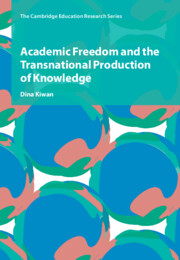The freedom to teach, pursue research and produce knowledge, and communicate the findings of this research is a value we take for granted as a prerequisite for academic excellence and for the creative production of knowledge within the university space. The integrity of academic institutions is usually assessed in terms of their ability to uphold these values. Moreover, in contrast to free speech, freedom in the context of the academy is often coupled with the expectation of responsible, reasonably justifiable academic expression, within the boundaries of the self-regulating norms of disciplinary communities.
These basic verities notwithstanding, the question of academic freedom remains of interest today as it has been in previous years, and continues to be a subject of probing inquiry. In the last three decades, the intensified investment in knowledge economies and the attendant increase in the number of universities globally have renewed the interest in exploring the boundaries of academic freedom within evolving regional and global contexts. Questions of academic freedom are often amplified by reports of threats to academics. Needless to say, there can be no meaningful academic freedom without functioning academic institutions, and as such academic freedom is premised on the safety and mobility of academics and their ability to exchange academic knowledge, just as much as it depends on the absence of internal and external conditions that inhibit the exercise of academic freedom, from university closures to underfunding and job security.
But physical safety is not the only prism through which academic freedom can be assessed. In this timely work, Dina Kiwan provides a compelling argument for a contextualized understanding of academic freedom and, considering the conditions under which it is exercised, further makes a case for an understanding of academic freedom that accommodates the often-assumed conflicting principles of diversity and inclusion. Kiwan’s book approaches the topic of academic freedom from four perspectives:
1) Academic freedom within university space: By examining competing conceptions of the mission of a university, as a producer of ‘true knowledge’; a contributor to the economic growth of the nation; or an agent of social change, Kiwan questions the notion that the university is a separate autonomous space in which objective knowledge is produced, independent of social contexts and constraints. She also underscores the role of the university in contextualizing academic freedom.
2) Academic freedom and the production of knowledge: Kiwan shifts the focus from a simple consideration of academic freedom as an unfettered form of free speech to an examination of the conditions for the production of knowledge in socially and institutionally diverse national, regional, and international contexts. She interrogates the conditions under which certain kinds of knowledge are legitimized and others are considered forbidden, and argues that legitimate knowledge is not an absolute value but is itself negotiated. And in turn, she maintains, academic freedom is constrained or enabled by these varying constructions of knowledge.
3) Academic freedom and inclusivity: One of the most compelling parts of Kiwan’s book is her interrogation of the presumed irreconcilability between principles of academic freedom and principles of diversity and inclusion. By contextualizing academic freedom in relation to other rights, including the right to not be dehumanized, she argues that the complementarity of the principles of academic freedom and those of justice and inclusion is a ‘necessary requisite’ for the inclusive production of knowledge.
4) Academic freedom in an international context: Most work on academic freedom focuses on the United States and United Kingdom, and discussion of academic freedom in a global context often frames the approach in binary terms, ‘contrasting the Global North as a haven for academic freedom with the Global South as a context that punitively infringes on academic freedom.’ In contrast to this one-dimensional narrative, Kiwan takes into account the complexities of globalization and underscores the agency of countries from the Global South in the drive to internationalize higher education. She examines ways in which academics in a global context experience academic freedom, and how this experience affects their lives and impacts their research and knowledge production.
Dr. Kiwan is personally invested in issues of academic freedom in an international context. She builds upon her earlier research and publications on inclusion and citizenship, and draws on her rich experience studying and working in institutions of higher education in the United Kingdom and the Middle East, and on original empirical data from Lebanon, the UAE, the United Kingdom, and the United States, to outline a transnational theory of academic freedom and the production of knowledge, and to offer compelling and original insights on this crucial topic.

